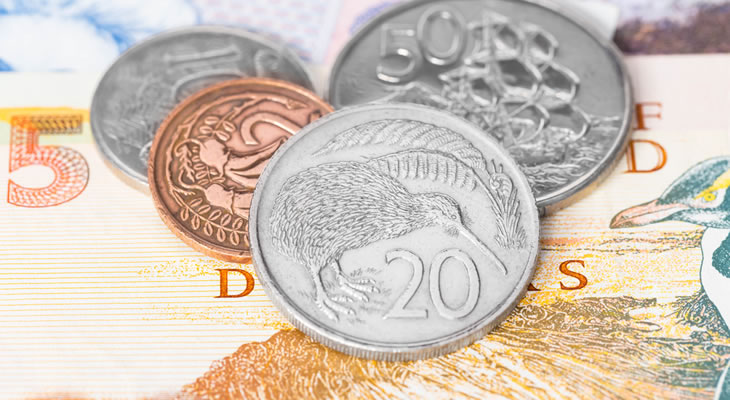GBP/NZD Recovers to Trade Flatly
- Pound Uninspired on ‘Brexit’ Warnings – Rows dominate headlines since ‘Super Thursday’
- ‘Kiwi’ Held Back by Poor Chinese Data – But New Zealand data prints positively
- Oil Price Rallies Boost Risk-Sentiment – New Zealand Dollar benefits
- Forecast: British CPI on Tuesday– Followed closely by latest Global Dairy Trade reports
After slipping around -0.3% earlier in the day, the Pound to New Zealand Dollar exchange rate recovered somewhat to trade more narrowly with the week’s opening levels of 2.1210. At the time of writing, GBP/NZD trended in the region of 2.1177.
‘Brexit’ debates continued to take UK headlines throughout the day, with the latest being a surprising unified speech between Chancellor George Osborne and ex-political-rivals Ed Balls and Vince Cable.
The three spoke at Stansted Airport on the expenses of trade tariffs, claiming it could cost an EU-less UK as much as £200b a year. As the ‘Remain’ campaign strengthened, so too did Sterling sentiment.
Earlier…
The Pound Sterling to New Zealand Dollar (GBP/NZD) exchange rate was able to climb slightly last week as weakened risk-sentiment held the ‘Kiwi’ back and ‘Super Thursday’ boosted the Pound. However, as ‘Brexit’ rows heated up the Pound slipped on Monday morning.
The typically volatile GBP/NZD pair hit a high of 2.1279 on Monday followed by a low of 2.1149 as the European trading session began. At the time of writing, the pair trended -0.3% down in the region of 2.1118.
Sterling (GBP) Slumps as Investors Focus on ‘Brexit’ Debates
With the EU referendum vote now just over a month away, debates between the ‘Remain’ and ‘Leave’ campaigns have heated up and concerns about Britain’s economic future are weighing heavily on consumer and business confidence.
This fear has been reconfirmed by recent news, which saw the Bank of England (BoE) drop its growth forecast from 2.2% to 2.0% during last week’s ‘Super Thursday’.
This was followed on Monday by the Confederation of British Industry (CBI) cutting their own growth forecast from 2.3% to 2.0%, citing the ‘tangible impact’ of ‘Brexit’ concerns on the UK’s economy. CBI Director-General Carolyn Fairbairn released comments in Monday’s economic forecast;
‘We expect the UK’s growth path to continue but it is likely to be at a slower rate than previously thought.
A dark cloud of uncertainty is looming over global growth, particularly around weakening emerging markets and the outcome of the EU referendum, which is chilling some firms’ plans to invest.
At present, the economic signals are mixed – we are in an unusually uncertain period.’
The CBI also expects growth to hold at 2.0% in 2017, down from the previously forecast growth of 2.1%.
Rightmove house price reports released at the beginning of the new week’s session did little to inspire the Pound. The data showed that property price growth slowed from 1.3% to 0.4% month-on-month and gained from 7.6% to 7.8% year-on-year.
New Zealand Dollar (NZD) Attempts Advance Despite Poor Chinese Data
While the New Zealand Dollar initially saw spikes of distaste as the new week began, it began to make a more solid attempt to gain on Sterling as European markets opened and investors reacted to the latest economic warnings.
Chinese data released on Saturday was largely negative, with industrial production falling from 6.8% to 6.0% year-on-year and retail sales also dropping lower than markets expected, from 10.5% to 10.1%. As China is one of New Zealand’s most vital trade partners, the poor data weighed on ‘Kiwi’ appeal.
However, New Zealand Dollar sentiment may have been improved slightly since, as New Zealand’s performance of services index showed a decent improvement from 55.1 to 57.7 and commodity sentiment appeared to improve slightly.
According to The Guardian, various factors in global oil trade have led to a temporary end to oversupply of the commodity. Oil prices rallied as a result and the appeal of commodity-correlated currencies like the ‘Kiwi’ improved.
However, the New Zealand Dollar’s gain was not bullish, as commodities with stronger ties to the Asia-Pacific region, like iron ore and powdered milk, continued struggling kept risk sentiment from rising too high.
Pound Sterling to New Zealand Dollar (GBP/NZD) Exchange Rate Forecast: UK CPI, Global Dairy Trade Ahead
Tuesday looks to be a busy session for the GBP/NZD exchange rate, with the Reserve Bank of New Zealand (RBNZ) due to release its 2-year inflation expectation report in the morning. Its previous figure was 1.63%.
Britain’s key Consumer Price Index (CPI) report follows later in the morning, and inflation is expected to slow from 0.4% to 0.3% month-on-month and hold steady at 0.5% year-on-year.
Lastly, New Zealand Dollar sentiment could be significantly affected by Tuesday’s dairy auction report. The bi-monthly auction showed a -1.4% decrease in prices of New Zealand’s most lucrative commodity on the 3rd of May, but ‘Kiwi’ sentiment could strengthen if prices improve.
Wednesday looks set to be comparatively quiet for New Zealand data, but will see the release of anticipated UK jobless claims, weekly earnings and unemployment reports.
The Pound Sterling to New Zealand Dollar (GBP/NZD) exchange rate trends in the region of 2.1118, while the New Zealand Dollar to Pound Sterling (NZD/GBP) exchange rate trades at around 0.4733.


Comments are closed.